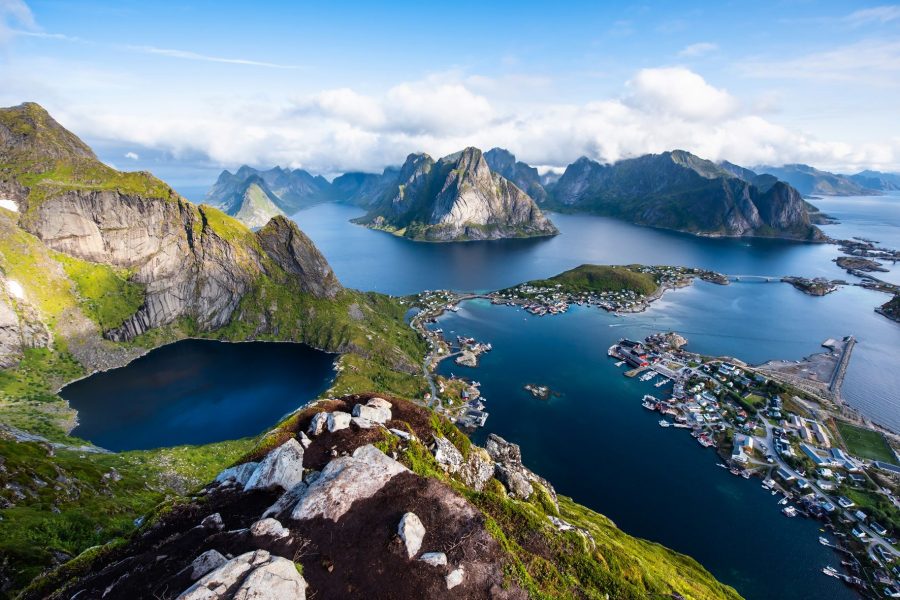text: Vilhelmiina Vainikka, Rosalind Bryce, Bobby Macaulay
ETRAC (Ethical Tourism Recovery in Arctic Communities) researched what impacts COVID-19 -pandemic has had on tourism stakeholders, what have been their coping strategies and opportunities as well as what is required for the future in terms of enabling ethical tourism recovery. The project continues the work of the lead partners from four previous NPA projects – ARCTISEN, W-POWER, SHAPE and SAINT. The full report of this study can be found from Resources (interreg-npa.eu)
During the project a survey was distributed among the tourism stakeholders. In total 38 responses were received from Finland (21), the UK (10), Canada (2), one each in Belgium, Greenland, Iceland, Ireland and Russia. The most common types of respondent were SMEs or start-up businesses (10) and higher education or research institutions (9), followed by NGOs and interest groups (7), business support organisations (6), Destination Management Organisations (DMOs) (6) and other types of tourism enterprise (5). In addition, small group discussions were facilitated at the kick off webinar of the project for the participants (appr. 20). The results of these will be summarized in the following.
Results 1: General impacts of Covid-19 on tourism
The decline of international visitors and increase of the domestic visitors has had both positive and negative impacts on stakeholders. Positive effects include a light shift towards cultural tourism and more interest into local traditions and culture, but this did not include all regions or all stakeholders. Negative impacts include tensions in rural communities over availability of affordable housing due to increased demand for holiday accommodation by the domestic tourist sector.
Growing interest in outdoor tourism in natural areas has been another “winner” during the pandemic. Positive impacts include improved consumer perceptions of nature, but a negative one is for example overcrowding and littering in some areas.
Economic pressures have led to unemployment and business closures. The stakeholders are still operating within uncertainty and need to adapt their practices according to changing restrictions.
Results 2: Opportunities for innovation and change in tourism practices
The pandemic has created opportunities for innovation and business development. Some stakeholders utilized the opportunity to reconsider the broader philosophy around tourism and led businesses to more explicitly consider and adjust their activities with regard to its impacts on climate change, local people and sustainability more broadly.
New online tools and programmes have opened up possibilities for businesses and enabled new business practice. There has been an increase in the use and importance of digital tools in the marketing and provision of tourism experiences. One of the benefits has been the online networking and collaboration through which the businesses have increased their reach and access to information.

Results 3: Impact on working practices
The respondents reported difficulties in recruiting staff after pandemic had caused periods of unemployment and the situation continues to be uncertain. The young have been particularly hard hit in terms of their employment in tourism sector. Another group effected are the women, often employed in the tourism services.
Results 4: Strategies for ethical recovery
The survey results suggest that there is a critical need to provide ongoing support to SMEs throughout the recovery process. Financial support should be accessible, tailored to specific circumstances and targeted to areas where it is most needed. Training in technology, digital marketing and development of new projects would provide additional support
According to the stakeholders, networking at the regional level and the development of alternative tourism products are important measures to support recovery. An increased attention on domestic tourism was identified as a potential pathway towards responsible and ethical tourism, with a focus on nature and cultural tourism
Community driven tourism plays a crucial part in driving an ethical and sustainable tourism recovery. Stakeholders placed a focus on the importance of partnership: developing and maintaining connections and collaborations for mutual benefit and sustainability.
Barriers to more ethical and sustainable tourism include a lack of clarity over the definitions of these terms and the need to manage trade-offs between different aspects of sustainability.
Conclusions:
COVID-19 -pandemic has had both negative and positive impacts on tourism stakeholders. They see that community-based tourism would be the way forward and that there is growing interest in it. Similarly, nature-based tourism has been increasingly in focus during the pandemic. Stakeholders wish for support in local and international networking, which is crucial for ethical recovery. It is clear that there is need for more ethical tourism in the future with support to concretize the concept in practice. ETRAC will support this transition with an online open innovation and training platform, online knowledge dissemination and networking events and strategy work so stay tuned. You can follow ETRAC news in ARCTISEN Facebook or on the project website https://etrac.interreg-npa.eu
More information: Vilhelmiina Vainikka, University of Lapland, vilhelmiina.vainikka(at)ulapland.fi
